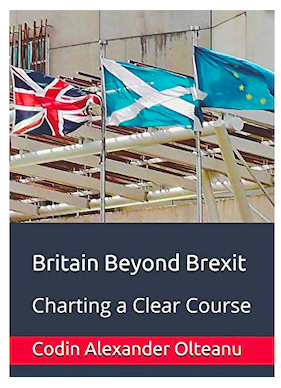For almost five years Christine Lagarde has held the position of Managing Director of the International Monetary Fund (IMF) - the first woman to ever do so. She had acquired in her previous private law practice career as well as in her public political career in France the reputation of a hard-nosed, effective leader as well as Europe's best Finance Minister during the two years preceding her appointment as head of the IMF. Her handling of French finances during the 2008 global financial crisis made her the leading contender to the succession of Dominique Strauss-Kahn whom she succeeded with the support of the United States and of most other European states. She has been intimately involved in managing the Greek financial crisis and had the courage to recognize that the IMF's initial austerity package needed to be rethought and adapted to Greek citizens’ actual needs and to their country’s ability to repay its creditors over the long-term.
Her first intervention regarding Britain's Brexit referendum took place in November 2015 when she called for the UK to remain within the EU and stated that from a personal point of view she “very, very much hoped that the UK stays in the European Union”.
Her second more robust intervention happened at the January 2016 World Economic Forum in Davos where she delivered a passionate speech in favor of a “global policy upgrade” of the international monetary system which according to her was absolutely essential in light of the current environment of elevated uncertainty and financial market volatility. She went on to explain that:
"We need a policy upgrade at the global level. We need an international monetary system that helps emerging and developing economies preserve stability, achieve stronger, more sustainable growth, and embark on a path of convergence with advanced economies. A system that reduces spillovers that hurt everybody. What do I mean by that? I mean a stronger global financial safety net, and a framework for safer capital flows."
Ms. Lagarde then outlined the IMF's two big concerns in this climate: the volatility and uncertainty having to do with the ongoing European refugee crisis which threatens to destroy the borders-free Schengen space; and the situation “…with Brexit and whether there is a deal to be had between the United Kingdom and other members of the European Union, which we hope very much”.
Finally during a more recent interview Lagarde told CNN that Britain’s current steady growth could well be jeopardized by the uncertainty in the run-up to the referendum on EU membership in June: “Uncertainty is bad in and of itself. No economic player likes uncertainty. They don’t invest, they don’t hire, they don’t make decisions in times of uncertainty.”
She then explained that Britain had benefited from trade and financial ties with the EU but also from the migration of workers back-and-forth, and finally explained how she viewed the possible consequences of a Brexit: “My hunch is that (a Brexit) is bound to be a negative on all fronts... For those that stay, because there are fewer of them, and for those who go, because they lose the benefit of facilitation of exchange.”
These three interventions by the head of the IMF regarding the UK’s continuing membership of the EU highlights Ms. Lagarde’s three key current concerns. First of all, she understands that the world's current global financial structure is very vulnerable to a new economic crisis, as it has failed to develop the institutional tools necessary to prevent it or to mitigate its impact should it arise again. She sees Britain's role as critical within this system - and in particular the UK's ability to work with its European partners in order to stabilize financial markets and to lower degrees of uncertainty and volatility in them.
Her second concern is that Britain's departure from the EU would endanger the growth and vitality of both the UK economy as well as the combined economies of the remaining EU member states. The joint impact of such downturns could very well trigger a new global financial recession.
Ms. Lagarde’s third key concern is one that looks at the longer-term: the integration of developing markets comprising 85% of the world’s population into a global financial system that offers them a global financial safety net and a framework for safer capital flows. Such a “global policy upgrade” as she names it would be even more difficult to achieve if Britain left the European Union and rendered cooperation between developed countries indispensable for such a fundamental reform even more difficult to achieve in practice.
Based on these interventions and arguments it is absolutely clear that the IMF as an institution and Ms. Lagarde in particular see it as critically important for the future stability and growth of the world economy that the UK remains an integral part of the European Union and continues to work closely with its European and North American partners to bring about the “global policy upgrade” she called for in such forceful terms in her recent 2016 Davos speech.

